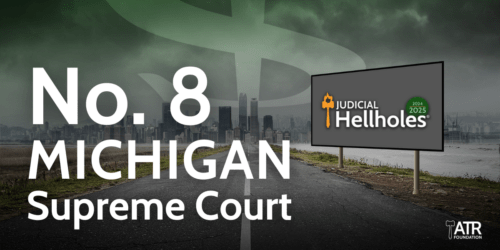MMPA and Punitive Damages Reform – S.B. 224
MISSOURI MERCHANDISING PRACTICES ACT (MMPA) REFORM A person seeking to
MISSOURI MERCHANDISING PRACTICES ACT (MMPA) REFORM
A person seeking to recover damages for unlawful merchandising practices shall establish that the person acted as a reasonable consumer, that the alleged unlawful act would cause a reasonable person to enter into the transaction that resulted in damages, and the individual damages with sufficiently definitive and objective evidence to allow the loss to be calculated with a reasonable degree of certainty. A court may dismiss a claim for failure to show a likelihood that the alleged unlawful act would mislead a reasonable consumer. In a class action, any class representative shall establish these requirements. All other members of the class shall establish individual damages in a manner determined by the court. In addition to current damages available, a court may provide equitable relief as it deems necessary to protect the party from the unlawful acts.
No action may be brought under these provisions to recover damages for personal injury or death in which a claim arises out of the rendering of or failure to render health care services. Furthermore, this act provides that any award of attorney’s fees shall bear a reasonable relationship to the amount of the judgment. However, when the judgment grants equitable relief the attorney’s fees shall be based on the amount of time reasonably expended.
PUNITIVE DAMAGES REFORM
Provides that punitive damages shall only be awarded if the plaintiff proves by clear and convincing evidence that the defendant intentionally harmed the plaintiff without just cause or acted with a deliberate and flagrant disregard for the safety of others, and the plaintiff is awarded more than nominal damages. Punitive damages may be awarded against an employer due to an employee’s conduct in certain situations, as provided in the act. When an employer admits liability for the actions of an agent in a claim for compensatory damages, the court shall grant limited discovery consisting only of employment records and documents or information related to the agent’s qualifications.
A claim for punitive damages shall not be contained in the initial pleading and may only be filed as a written motion with permission of the court no later than 120 days prior to the final pretrial conference or trial date. The written motion for punitive damages must be supported by evidence. The amount of punitive damages shall not be based on harm to nonparties. A pleading seeking a punitive damage award may be filed only after the court determines that the trier of fact could reasonably conclude that the standards for a punitive damage award, as provided in the act, have been met. The responsive pleading shall be limited to a response of the newly amended punitive damages claim.
The legislation provides that the defendant may also be credited for punitive damages paid in a federal court.
These provisions shall not apply to claims for unlawful housing practices under the Missouri Human Rights Act.
Modifies the definition of “punitive damages” as it relates to actions for damages against a health care provider for personal injury or death caused by the rendering of health care services. In order to be awarded punitive damages, the jury must find by clear and convincing evidence that the health care provider intentionally caused damage or demonstrated malicious misconduct. Evidence of negligence, including indifference or conscious disregard for the safety of others, does not constitute intentional conduct or malicious misconduct.
Latest News
View all news
Louisiana’s “Judicial Hellhole®” Status Costs Residents $965 Annually In “Tort Tax”
Nuclear Verdicts® and Insurance Fraud Plague State’s Legal System
King County Courts Named ‘Judicial Hellhole®’ for First Time
New Report Ranks Seattle-Area Courts Among Worst in US
Michigan’s Legal Climate Kills 97,000 Jobs Annually, New Report Reveals
$1,046/Person ‘Tort Tax’ — Court Expands Liability, Michiganders Pay
Show Me Your Lawsuit: St. Louis Ranks 7th in ‘Judicial Hellholes®’ Report
Courts Threaten Preemie Formula Access, Residents Pay $1,475/Person/Year ‘Tort Tax’
Cook County’s $21.3 Billion Problem: Lawsuit Abuse
Report Ranks County 6th Worst ‘Judicial Hellhole®’
California’s Judicial Hellhole® Status: Where Innovation Meets Litigation
Lawsuit Abuse Costs Every Californian $2,300 Annually, Kills 825,000 Jobs






